Mozambique: President of the Republic meets with Venâncio Mondlane to strengthen political ...
Meeting with the Swiss peacemaker in Mozambique
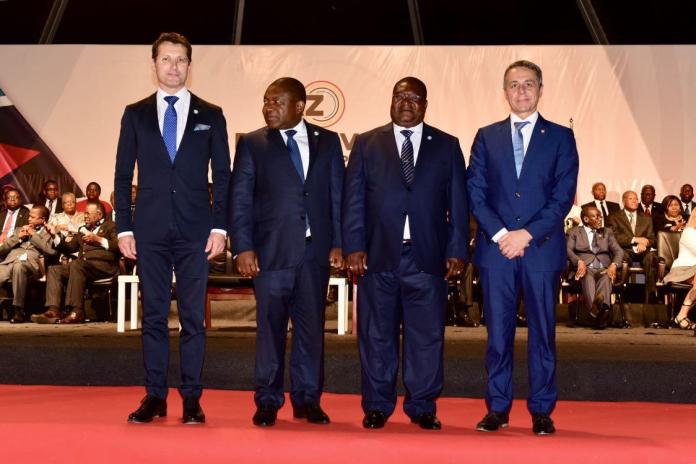
(from left to right) Ambassador Mirko Manzoni, Mozambican President Filipe Jacinto Nyusi, leader of the opposition party Osuffo Momade and Swiss foreign minister Ignazio Cassis. (Keystone)
The newspaper Tages Anzeiger called it “the greatest success of Swiss peace diplomacy for many years”. The peace agreement reached in Mozambique also has a Swiss face, that of Ambassador Mirko Manzoni which swissinfo.ch recently met.
The image is symbolic. On August 6th, Mozambican President Filipe Nyusi, from the ruling party Frelimo and Ossufo Momade, leader of the opposition Renamo, embrace each other during the signing ceremony for a historic peace agreement. Beside, a little apart, a white man with glasses applauds and smiles. It is Mirko Manzoni, Swiss ambassador, who led the negotiations for over three years, succeeding in the difficult task of convincing the parties of peace, after decades of civil war and guerrilla warfare.
“The greatest success of Swiss peace diplomacy for many years” according to the Tages Anzeiger, which recently published two in-depth and in-depth articles about this negotiation and the movements in the Federal Department of Foreign Affairs (FDFA) (Schweizer Diplomat beendet jahrzehntelangen Krieg in AfrikaExternal Link and Schweizer Friedensstifter nach Erfolg in Afrika zurückgestuftExternal Link).
At the end of the month, Mirko Manzoni will leave the post of ambassador and take on the prestigious role of personal envoy of the UN secretary general, Antònio Guterres, for Mozambique. We interviewed him.
swissinfo.ch: Ambassador Manzoni, did you expect this call from Antònio Guterres?
At the end of the year I would have had to change mission, but I knew that on the Mozambican side there was a will to stay in the country. So I had a feeling even though Guterres’s call was a surprise. Being appointed by the UN Secretary General happens once in a lifetime. His words were very emotional and I immediately decided to say yes on the phone. What else could I do?
It might be thought that, once the peace agreement was signed, Switzerland would have to see to it that she remained there. Instead the FDFA has decided to send it to Central Asia. A somewhat strange choice …
I believe that the Mozambicans were faster than the Swiss. There was something that didn’t work and I say it without any desire to argue. I think that every effort should have been made to ensure that the team negotiating the agreement remains in place and continues to follow the agreement. The coming years will be decisive and we still have a certain responsibility. This is not the case, but the support of Federal Councilor Ignazio Cassis has never been lacking. The appointment of Guterres made it possible to ensure that I remained in the country and this received the full support of Switzerland.
“The most important preliminary agreements have been signed before the peace agreement. This has laid the necessary foundations so that it will now be difficult to retrace your steps. There will be no more reasons to fight militarily.”
What will your new task be?
First of all, the accompaniment to the October elections which will be a sort of litmus test of the peace agreement. My mandate follows what I have done in the last three years, namely that of being the mediator between the two parties. Then there is a part that is still to be completed, namely that linked to the reintegration of 5,300 Renamo soldiers into society. Then, we need to consolidate the agreements made. The job will certainly not fail.
Let’s take a step back: how did you and Switzerland take on the role of mediator?
Mediation was already underway in 2016, but it didn’t work so well. We have thus received a request for our good offices. Switzerland and Mozambique have a relationship anchored in time, from the time of the Protestant missions, and in the Mozambican mentality we have always been considered as trusted partners. The then Federal Councilor Didier Burkhalter responded favorably and so we began our work.
How did you work?
We first dealt with a technical part and then a political mediation was made, carried out in a very discreet way by a small team of three people who worked with me. For three years we have been negotiating, doing thirty missions in the jungle where there were fighters.
In May 2018 we succeeded in obtaining a first political agreement: the revision of the Constitution which provides for a better redistribution of power within the country. A few months later we were able to establish the military agreement that provides for integrating a number of opposition soldiers into strategic places in the Mozambican army.
The peace agreement came following these two previous agreements. This is not always the case in mediation reports …
In this case the novelty was precisely the fact that the most important preliminary agreements – the new Constitution and the military question – were signed before the peace agreement. This has laid the necessary foundations so that it will now be difficult to retrace your steps. In short, there will be no more reasons to fight militarily.
In May 2018 there was a time when all your mediation work could jump. Can you tell us what happened?
It was the death in May 2018 of Afonso Dhlakama, head of Renamo for over 35 years. At the time of death, nothing concrete was signed and the entire mediation could have been skipped. It was a terrible moment. However, instead of retiring, President Nyusi was conciliatory and reacted as he should, playing the game of all Mozambicans and pushing his party to accept the agreement on the Constitution. Thus it was that only twenty days after the death of Dhlakama the constitutional revision was voted, the most delicate point of the whole agreement. For us it was a decisive moment. Which also made us breathe a sigh of relief.
“African countries are often blamed for corruption, but it must be admitted that corruption is not born in Africa alone. Often the engineering behind these great corruption cases is built in Western countries.”
In March 2019, however, Cyclone Idai caused deaths and floods in Mozambique. Has this natural wind played a role in the negotiations?
Not directly, except for the fact that the two parties agreed and there was a kind of national unity. A sign of hope: at least in the key moments, which are particularly difficult, we agree. This is also the case for the problem of jihadists in the North, where the opposition is on the side of the majority. I consider it an important change in mentality that makes the national interest a priority for everyone today.
How do you look at the upcoming October elections?
In a positive way. The peace agreement is solid and the next elections will be held in the already modified constitutional framework. Without being too optimistic, I do not believe that a return to the past like other countries is possible The political agreement, which changes the architecture of the state was signed in advance and was applied. So today there is no longer any political reason to fight with weapons.
The country is rich in raw materials. Peace signed, does it not now fear an assault on natural resources?
The exploitation of natural resources will surely be one of the most delicate and crucial points for the near future of Mozambique. It will not be an easy path because the resources of which the country is rich will be a source of very high interest, even from foreign investors. The new Constitution, however, will allow the opposition to be able to manage the provinces where it wins and the relative natural wealth. Given that Mozambique has resources everywhere this will allow a certain redistribution of wealth.
In these years, another Swiss affair is linked to Mozambique: the one concerning Credit Suisse and the two-billion-dollar loan that plunged the African state into a serious crisis. What is your opinion about this case?
This is a serious matter that should make us think. African countries are often accused of corruption, but it must be admitted that corruption does not arise in Africa alone. Often the engineering behind these large corruption cases is built in Western countries where the real gains from the corruption agreements end. The case of the debt in Mozambique proves it. Recently, the Kremlin-controlled Russian bank VTB made a gesture by opening negotiations on their debt. I wonder if Credit Suisse will do the same and it will be equally cooperative.


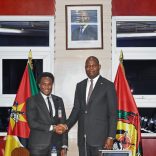
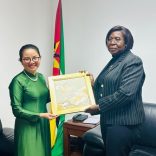

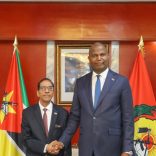
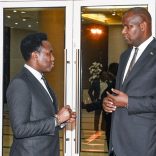





Leave a Reply
Be the First to Comment!
You must be logged in to post a comment.
You must be logged in to post a comment.